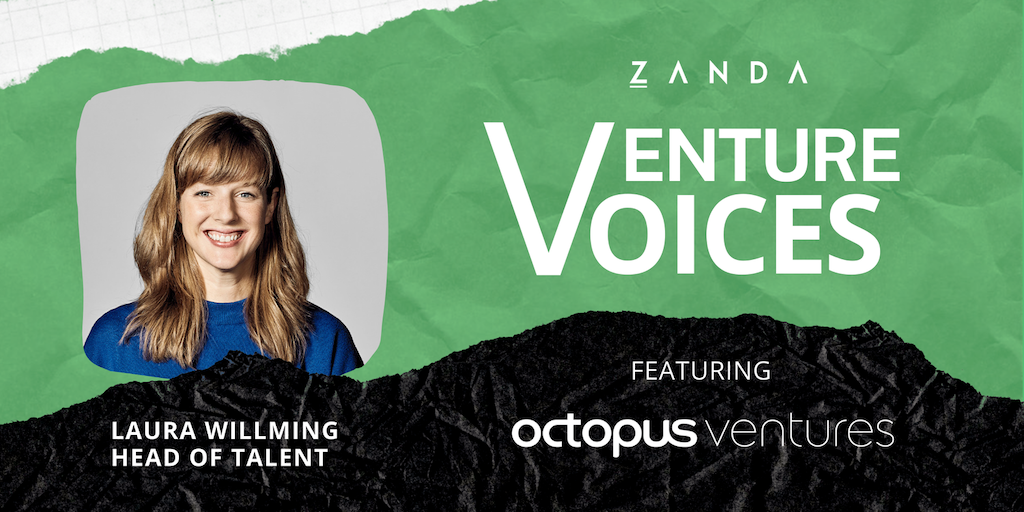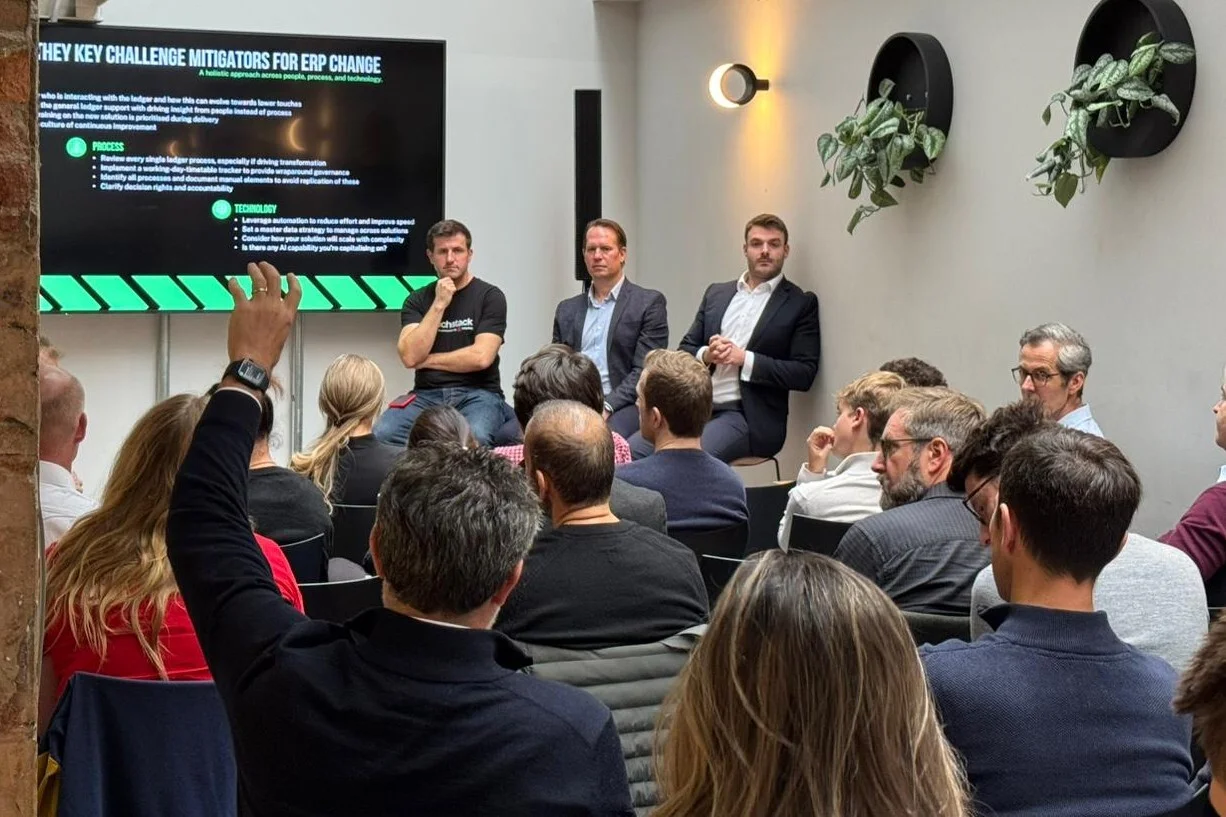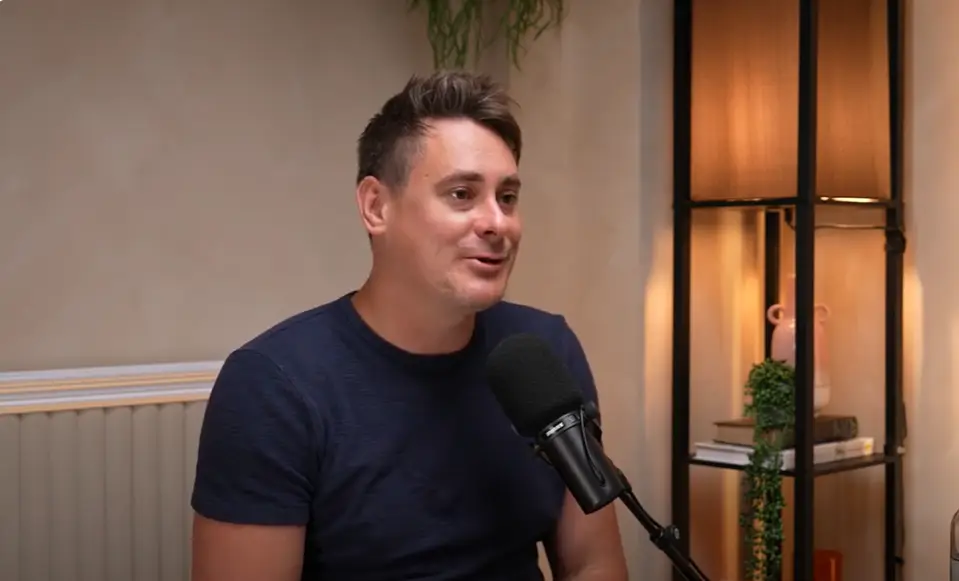Venture Voices | Octopus Ventures
18 Dec, 202410 Minutes
For our final Venture Voices episode in 2024 we were lucky enough to be joined by Laura Willming, Head of Talent at Octopus Ventures. Octopus Ventures are a London-based, tech VC firm with a focus on companies at various stages of growth. They manage multiple funds, that support pre-seed through to Series B+ businesses. Their investments span a wide range of industries, including Fintech, Healthtech, Climatetech, B2B software, Biotech, Deeptech, and consumer companies. Despite the diversity in sectors, the common thread in all their investments is the people—they back founders and businesses with missions to make a positive impact on the world.
Laura Willming oversees the portfolio team at Octopus Ventures, which has two main components. One is the people and talent function, which she leads, and the other focuses on corporate ecosystem development. The portfolio team partners closely with both founders and investors, addressing the people strategies and challenges that naturally arise in early-stage and growth companies. The team consists of six members, and their work ranges from stepping in as interim heads of people/talent to providing expert advice and support at a moment’s notice. Additionally, they build programs that leverage the collective knowledge and experience from the over 180 companies they actively engage with each year.
Laura began her career in user research, focusing on people-centred roles within the tech industry. Her journey started at Harry’s, a startup in New York, where she joined early on when the team was just around 15 people. During her time there, she witnessed the company’s growth, scaling from 15 to a few hundred employees across multiple locations worldwide. After that, she transitioned into a people and talent role before moving into venture capital at a fund in New York. A few years later, she relocated to London and joined Octopus.
Thanks for joining us Laura. It would be great to learn more about your time at Harrys. During that rapid growth, how did the company culture evolve and are you seeing similar patterns now with the portfolio companies you're supporting?
I feel fortunate to have had Harry’s as one of my early career experiences. The early team there built such a strong culture that, in many ways, persisted over my four and a half years with the company. Over time, it became a place that felt very familiar and comfortable. One of the biggest challenges we faced was building a strong culture where people were motivated to show up, do their best work, and support one another by resonating with the company's core values. Then, as the company scaled and new people joined, we had to figure out how to retain the best aspects of that culture while also letting go of elements that no longer served us.
Are you noticing any common pain points across founders in Octopus Ventures portfolio, regardless of their stage?
Yes, there are definitely common challenges that come up. Hiring is consistently one of the biggest issues we encounter. A few years ago, the focus was on how to quickly hire large volumes of people while managing countless other responsibilities. Nowadays, the challenge has shifted to finding and hiring the absolute best candidates for specific roles.
For early-stage founders, this task is particularly challenging. They need to attract top talent, which is inherently difficult due to the limited pool of exceptional candidates. They often need to meet many people to find the right fit and then convince those candidates to take a risk by joining a nascent company. Even if a founder has strong conviction about their mission, they must effectively communicate this to potential hires, making it compelling enough for them to commit their careers to the startup.
This process is not only challenging but also time-consuming. Founders are typically incredibly busy, so finding the time to meet numerous candidates, sell them on the vision, and handle all other responsibilities can be a significant hurdle.

Do you observe any specific functional areas where founders tend to face challenges at different stages of growth?
It’s not so much about specific “holes” but rather natural challenges that emerge as teams grow. At the early stage, the focus is on hiring a few key people to drive initial growth. As the team expands, communication becomes a significant challenge—how to keep everyone aligned, set clear objectives, and ensure everyone is on the same page within the organizational structure.
As the company scales further, new challenges arise, such as ongoing employee development, progression, and designing compensation models to retain top talent. This is especially important for early team members whose experience and knowledge are crucial. These are just a few examples of the evolving issues that founders face as their companies grow.
When discussing the C-suite and senior hiring with founders, do you ever find their approaches surprising? Since many founders are handling senior hires for the first time, how do they typically engage with your advice?
Nothing surprises me too much anymore, but I do find that people are generally very receptive to advice. The challenge often lies in implementing it, as giving input and coaching can only go so far. What I really enjoy about my role is when my usual approaches are questioned or challenged. It pushes me to rethink and adapt, as hiring models that worked ten years ago might not be as effective today.
Founders are typically open to guidance, but they are incredibly busy. For example, I often suggest that if hiring is a top priority, they should dedicate at least one day a week to recruitment. However, fitting this into their packed schedules can be a struggle. Despite these challenges, the willingness of founders to engage with and consider new approaches is something I truly value.
Given your experience, do you think dedicating a full day each week to recruitment is equally crucial for a Series A business that's scaling rapidly?
For a Series A company scaling quickly, I believe it’s crucial to dedicate at least 20% of your time to recruiting, especially if you have several key roles to fill. This time should be spent meeting potential candidates, initiating processes, and conducting interviews. Hiring is a significant decision for both the company and the candidate, and it warrants a substantial investment of time. A strong hire can have a profound positive impact on the business by providing growth opportunities, while a poor hire—due to insufficient attention in the recruitment process—can be detrimental.

Andrew: It’s fascinating how hiring a B player instead of an A player for a key role can have significant repercussions. Whether due to bad luck or a lack of commitment in the hiring process, a subpar hire often results from rushing to fill a position rather than thoroughly assessing candidates. We know that B players tend to hire more B players, leading to a decline in overall quality. When a poor hire is made at the C-suite level, it can create a ripple effect through their direct reports, significantly impacting the entire team. It’s a situation we often observe, and sometimes there’s a nagging sense that it could happen if the hiring process isn’t handled with the necessary care and attention.
A few months ago, we hosted a panel with several CROs who shared their experiences and advice on hiring. One of them pointed out that a small concern you have today can become a major problem six months down the line. This resonates with what you mentioned—often, we have an intuitive sense when a hire isn’t quite right, but pressures from the board or a desire to move on from a prolonged search can lead to rushing the decision.
Senior hires typically require three to six months to find, an additional three to six months for them to transition from their previous role, and then another six months to determine if they’re a good fit. If you delay this process, you could end up with a year or more before realizing that the hire isn’t working out, and then you’re back to square one. In an early-stage company, this means you might spend two to three years dealing with the ramifications of a poor hire, which is a significant amount of time. Each new hire is an opportunity to bring in someone who could be a game changer for the team, so missing out on this opportunity due to a hasty or flawed hiring process can have a profound and negative impact.
How do investors on the board respond if a founder experiences two or three consecutive poor hiring decisions? Additionally, from your perspective, what constitutes a well-executed hiring process for one of your startups?
Bad hires are inevitable, but the key is to reflect on why they happened, learn from the experience, and make adjustments to avoid repeating the same mistakes. For founders, it's crucial to act swiftly once you recognize a hire isn’t working out to minimize further impact. The way you handle and address these situations can significantly influence how your team and board perceive your management skills.
As for a successful interview process, it should involve a thorough exploration of a candidate's background, including their past roles and achievements, to determine whether they've been A players or B players. Implementing role-specific exercises can help assess their core skills in action. Additionally, thorough reference checks are essential, particularly for senior positions, to validate their suitability and past performance.

Do you ever engage with founding teams or the senior leadership team before making an investment?
Yes, we do meet with founding teams and their senior leadership before making an investment. These meetings serve two purposes: to get to know the startup founder and their team better and to explain the unique value that Octopus Ventures offers. It’s important for us to ensure that they understand the benefits of joining the Octopus Network and how we can support their growth.
What feedback do you receive from founders about what they value most in Octopus Ventures’ offering when they choose to partner with you?
Many founders are new to building teams, especially when they’re raising funds to expand their workforce. What sets us apart is our ability to bridge this expertise gap and provide rapid upskilling.
Founders appreciate that we don’t just passively send candidates their way. Instead, we work closely with them to understand their goals, team structure, and specific hiring needs. Our team, including myself, consists of experts with deep domain knowledge in areas such as Deeptech, Biotech, Fintech, B2B software, consumer companies, and Healthtech. This allows us to offer valuable insights and support based on extensive experience, ensuring a tailored and efficient approach to their hiring needs and business models.
Andrew: Additionally, with a portfolio of 150 businesses, you have extensive data on how specific hires have performed across various stages and sectors. This wealth of information provides valuable insights into what works and what doesn’t, especially in fields like Healthtech.
Moreover, founders often find the role quite lonely, and it’s rare for them to have someone genuinely interested in their revenue model and team structure to discuss ideas with, unless they have a chief people officer or non-executive director. Being able to bounce ideas off someone who understands their unique challenges can be incredibly cathartic and supportive for them.
Absolutely. We aim to build relationships based on openness and trust. While our role is to work from the investor side, we recognize that at the core of everything are people with their own challenges. We strive to be as supportive as possible, which includes maintaining a high level of confidentiality in our conversations.
Can you identify any specific characteristics or elements within a founding team or senior leadership team that might be considered red flags from a people perspective, potentially affecting investment decisions?
For me, the biggest red flag is when a team isn’t fully aligned on their goals and strategy, especially during the early stages. It’s crucial for the founding team and senior leadership to be united in their vision and approach. If there’s a lack of clear communication and consensus on how to achieve their objectives, it becomes apparent during conversations. This misalignment can lead to significant issues and breakdowns in execution.
When senior team members openly express conflicting views, such as one person advocating for a particular approach while another disagrees, it signals a serious alignment issue. This kind of disunity at the top inevitably trickles down through the organization, leading to confusion and inefficiency.
I often picture this like forces in physics: if all the arrows are pointing in the same direction, progress is swift and effective. However, if they’re scattered and misaligned, it creates chaos and frustration, hindering overall progress and performance.

Do you think that the ratio of that happening in a fully remote business is higher than a hybrid or office based business?
It’s difficult to definitively say whether alignment issues are more common in fully remote versus hybrid or office-based teams. Many fully remote teams excel at detailed written communication, which can be highly effective for alignment. In contrast, hybrid and office-based teams might rely more on spontaneous conversations, which can sometimes lead to misalignment. Each setup has its own strengths and challenges, so it’s not straightforward to determine which has a higher ratio of alignment issues. It’s a thought-provoking question, though. Maintaining alignment is crucial for achieving sustainable growth, as it ensures that all team members are working towards the same goals and adapting effectively to changes.
In terms of trends within high-performing portfolio businesses, are there any standout practices or characteristics from a people, talent, or operational perspective that you find exceptional?
It’s challenging to pinpoint just one factor, but I find that successful businesses share some foundational traits. They typically have very clear objectives and focus on a few key goals. High alignment and accountability across the team are crucial, and when this is established at the senior level, it often cascades throughout the organization.
As companies move into a growth phase, they need to shift to a high-gear focus on execution and delivery to ensure startup growth. This requires a clear understanding of their goals, a well-defined strategy, and a team that holds each other accountable. This phase is distinct from the early stage, where the emphasis is on finding product-market fit and experimenting with different approaches. During growth, the need for clarity and a strong work ethic becomes even more critical, and the ability to adapt and execute effectively is what drives success.
What’s your perspective on hiring a CFO for founders? How important is this role, and what impact have you seen it make on a company’s success?
It’s incredibly important. Time and again, experienced CEOs advise earlier-stage founders to hire a CFO as soon as possible. A CFO brings critical expertise in managing the financial health of the business, offering insights into what’s working and what isn’t, and driving revenue growth. They play a key role in shaping strategies for growth and managing fundraising efforts. Investing in a strong CFO early on can provide invaluable support and guidance, making it a crucial step for any growing company.

What do you find works best in terms of board dynamics or getting that immediate support?
It’s crucial to have advisors who are not only willing but also engaged in the challenges you’re facing and who genuinely support you through the thick of it. Establishing that kind of working relationship, along with a well-defined organizational structure, is key to effectively navigating the demands and pressures of the role.
How does your team currently manage the urgency of communication from your portfolio, do you have a system in place?
Yes, we do have a system in place for communication. When we first invest, we meet with founders to understand their goals, current team, hiring needs, and biggest people challenges. We build a relationship from the start, which makes it easy for founders to reach out whenever they need support. They have our direct emails and even WhatsApp for urgent matters. We commit to responding quickly because we know how fast-paced startups are. Our goal is to be an accelerator, not a blocker. So far, this approach works well, but as we scale and add more businesses, we’ll need to reassess its sustainability.
I noticed that you were a founder in the past. Are there any temptations or plans to start your own business again in the next ten years?
I’ve learned a lot since then, so we’ll see. My founding days were post-college and more of a collaborative effort with friends, which was a fantastic experience but quite different from what many early stage startup founders are doing today.
If you could recommend one or two books to founders, which ones would you choose and why?
The book I always recommend is Who: The A Method for Hiring by Geoff Smart and Randy Street. It provides a thorough process for hiring top talent, which is crucial for building a strong team and identifying growth opportunities. I suggest having this one on your shelf. As for a second book, there are so many great options, but another strong recommendation would be When They Win, You Win. It’s about leadership and management in a straightforward way, showing that effective management doesn’t have to be complicated. It emphasizes simple strategies to motivate and engage your team, making the process feel more intuitive and impactful.
And the last question, If there’s one additional benefit or flexible arrangement you’ve seen portfolio businesses implement beyond salary, bonuses, and share options, what tends to be especially valued and effective for teams?
One benefit that stands out is the nine-day fortnight. It’s not a perfect fit for every organization, but it’s proven to be quite effective and doesn’t seem too far-fetched for many companies. It allows employees to use that extra day to reset, prioritize, and reconnect, which can be invaluable for productivity and morale. Another benefit that’s impactful, though often more feasible for later-stage companies, is fertility benefits. These are highly valued and can be very sticky for employees.



